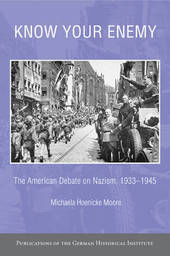
|
Know your Enemy: The American Debate on Nazism, 1933-1945
Hardback
Main Details
Description
This book analyzes the intellectual side of the American war effort against Nazi Germany. It shows how conflicting interpretations of 'the German problem' shaped American warfare and postwar planning. The story of how Americans understood National Socialism in the 1930s and 1940s provides a counter-example to the usual tale of enemy images. The level of German popular support for the Nazi regime, the nature of Nazi war aims, and the postwar prospects of German democratization stood at the center of public and governmental debates. American public perceptions of the Third Reich - based in part on ethnic identification with the Germans - were often forgiving but also ill-informed. This conflicted with the Roosevelt administration's need to create a compelling enemy image. The tension between popular and expert views generated complex and fruitful discussions among America's political and cultural elites and produced insightful, yet contradictory interpretations of Nazism.
Author Biography
Michaela Hoenicke Moore is Professor of History at the University of Iowa. She has taught at the Kennedy Institute of the Free University in Berlin, at the University of North Carolina, and at York University in Toronto and worked as a Senior Fellow in US Foreign Policy at the German Council on Foreign Relations in Berlin. She is the co-editor (with Bernard May) of The Uncertain Superpower: Domestic Dimensions of US Foreign Policy after the Cold War, and her articles have appeared in journals including Diplomatic History and Amerikastudien.
Reviews'This book provides the general and the scholarly interested reader with exceptionally important insights. First, the author tells us, on the basis of extensive primary source research, how and why the various American perceptions of Nazi Germany during the 1930s and during WWII tended to differentiate between Germans and Nazis. Second, that the Roosevelt administration itself was divided about its own war aims. Third, that this division allowed, in due course, a better, positive treatment of the postwar Germany than anticipated. And finally, that the legacy of pre-WWII appeasement, and of an alleged, coherent American crusade against Nazi totalitarian ambitions, which was hardly the case, became the root of American behavior during the Cold War all the way to our times. This work is highly recommended.' Shlomo Aronson, Hebrew University, Jerusalem 'This important book complements John Dower's classic account of American attitudes toward the Japanese in World War II, War Without Mercy. Exhaustively researched, Hoenicke Moore's study explains how cultural and racial affinities predisposed a broad swath of American opinion to cling to an ambivalent, forgiving view of the German enemy. Know Your Enemy helps explain why postwar Americans so quickly embraced the Germans as natural allies against 'semi-Asiatic,' Communist Russia.' Frank Costigliola, University of Connecticut 'An impressive study of American political and intellectual confusion about the nature of National Socialism, uncertainty about the complicity of the German people, and ambivalence about how to respond. Nazism as evil incarnate and World War II as the good war dominated American understanding after 1945, but as Hoenicke Moore provocatively argues, such moral clarity and political unanimity were lacking at the time.' Mary Nolan, New York University 'Michael Moore's excellent study is a deeply researched, well-written and analytically sharp intellectual history of how Americans struggled to understand the origins of, and the extent of the German people's responsibility for,Nazism in the years 1933-45 ...the book provides a great service by prompting us to think more deeply about where history ultimately stands in the spectrum between utility and liability.' The Journal of Central European History
|